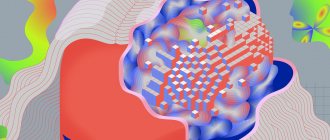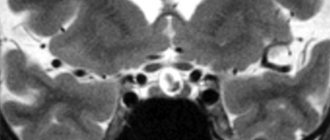: Reading time:
Psychotherapist and clinical psychologist Yulia Khvorova answers common questions about bipolar affective disorder (BAD).
In this article, I tried to answer the questions that clients with newly diagnosed bipolar disorder ask me. I will try to answer simply and clearly, based on scientific facts and information that I received during practical work with BAR.
What symptoms are used to diagnose bipolar disorder? How does the disease manifest itself?
Bipolar disorder is characterized by severe mood swings. The mood for several months, weeks or (less often) for several hours “goes to extremes” - it becomes too cheerful and too bad.
The mood for several months, weeks or (less often) for several hours “goes to extremes” - it becomes too cheerful and too bad.
Mania or hypomania is an elevated mood and violent physical and mental activity. Mental activity becomes heterogeneous - attention captures every detail, but it is difficult to concentrate on one thing for a long time. Thoughts are constantly “jumping”, one idea is quickly replaced by another. All emotions intensify: joy - to euphoria, irritation and resentment - to aggression, suspicion - to paranoia. Physical activity also increases: you almost don’t want to sleep (three hours of sleep seems enough), sexual desire increases. Behavior becomes impulsive, reckless, sometimes even adventurous and eccentric. A person can become obsessed with an idea. During a manic episode, delusions and hallucinations may occur.
Hypomania is liked by everyone who has experienced it at least once. With hypomania, unlike mania, delusions or hallucinations occur less frequently, criticality remains, and aggression is lower. However, hypomania is not a normal mental state; the brain works in an enhanced mode. Reserve resources are used to speed up mental processes, and when they run out, complete exhaustion occurs. With hypomania, the psyche seems to be running a sprint. Imagine if you only run all your life - your body will quickly deplete and wear out. It’s the same with the psyche. Hypomania can develop into more unpleasant states - mania or depression.
Reserve resources are used to speed up mental processes, and when they run out, complete exhaustion occurs. With hypomania, the psyche seems to be running a sprint.
Another sign of bipolar disorder will be not just a bad mood, but depression, from mild short-term to severe long-term. Here everything is the other way around. Activity drops: when you need to do something, there is neither strength nor desire. Mental activity is even more difficult: in addition to the lack of desire and strength, it is difficult to concentrate, remember, analyze, and make a decision. The experience of emotions becomes dull, with the exception of worsening resentment, guilt, hopelessness, confusion, anxiety or indifference. Appetite changes, insomnia or excessive sleepiness appears. Even if you are a very cheerful person, severe depression can cause suicidal thoughts. With severe depression, delusions and hallucinations may occur.
These phases can replace each other and can appear simultaneously. For a long time, only one pole can manifest itself - then even doctors, instead of correctly diagnosing “BAD,” may first diagnose “depression.” The breaks between episodes (intermissions) are different for everyone - it can be a month, a year, three years, five years.
In a healthy person, changes in the activity of mental processes are not so contrasting and are more amenable to regulation. They do not lead to a deterioration in everyday functioning - a person can successfully cope with the professional and academic responsibilities assigned to him, and establish and maintain relationships with others.
Diagnostics
There are certain formal criteria for MDP (at least 2 episodes, at least one of which has signs of mania or a mixed nature). In practical work, many circumstances are taken into account, which explains the need for a detailed history taking and a detailed conversation with the patient and his relatives.
To clarify the diagnosis, special tests for manic depression are used. BD is distinguished from overexcitation due to lack of sleep or drug use, neuroses, schizophrenia, secondary mental disorders against the background of somatic pathologies. In the elderly, differentiation from dementia and mood changes due to organic brain lesions is required.
What are the causes of bipolar mental disorder?
Unfortunately, science cannot answer why bipolar disorder occurs. What is known is that many factors interact with each other.
Now the occurrence and development of the disease is considered through the biopsychosocial model (BPSM). According to this model, the development of the disease is influenced by three factors - biological, psychological and social.
The biological factor includes genetics, physiological and biochemical characteristics of the body.
Psychological factors in the development of bipolar disorder include the number and intensity of stressful experiences, coping strategies, character traits, emotional sphere, and thinking.
Social factors - cultural and political situation, economic situation, microsocial environment (family, friends, professional environment, acquaintances).
The emergence and development of bipolar disorder is not caused by one of these factors, but is a consequence of their interaction.
Unfortunately, science cannot answer why bipolar disorder occurs. What is known is that many factors interact with each other.
Questions like “Why me?”, “What causes BAD?”, which cannot be answered, are called rumination. The thought chains that arise when thinking about such questions do not lead to an answer, but lead to a decrease in mood, increased anxiety and a feeling of hopelessness. Psychotherapeutic techniques and communication with loved ones will help you switch or abstract from such thoughts.
How is bipolar personality disorder treated? Will I be in a mental hospital?
The need for hospitalization may not arise if you take a responsible approach to treatment. If left untreated, episodes of mania and severe depression are likely to result in hospitalization. However, hospitalization does not put an end to a person’s life, but helps to get out of an episode of depression or mania and return to normal life.
As mentioned earlier, the course of bipolar disorder is influenced by three factors - biological, psychological and social. To minimize the impact of bipolar disorder on your life, you need to take control of all three factors. In this case, you will not have to go to the hospital and outpatient treatment will be sufficient.
The biological factor will be taken over by medications and a healthy lifestyle. A psychiatrist will prescribe the necessary medications for you. The medications must be taken regularly; you should not pause without consulting your doctor. If you experience unpleasant side effects, discuss this with your doctor and decide together whether to wait, change the dosage, or switch to another drug.
A healthy lifestyle helps maintain the normal state of all body systems, including the nervous system. Taking medications will not have a good effect if drugs or alcohol are simultaneously affecting the brain. The following will help you maintain your nervous system, and therefore all mental activity, in good condition: stable good sleep (at least seven hours), absence of bad habits (alcohol, drugs, smoking), regular physical activity, proper rest, adherence to a daily routine, proper nutrition.
The medications must be taken regularly; you should not pause without consulting your doctor. If you experience unpleasant side effects, discuss this with your doctor and decide together whether to wait, change the dosage, or switch to another drug.
Psychotherapy will help regulate and take control of the psychological factor. The recommended type of psychotherapy for bipolar disorder is cognitive behavioral therapy (CBT). Psychotherapy will not cure the disease, but will allow you to develop problem-solving skills, effective communication, and coping strategies. New skills or habits will help you cope with stress and anxiety, and resolve intrapersonal conflicts. At the end of psychotherapy, you will be able to independently apply these skills in life. Depressive episodes will be easier to experience, and their consequences will no longer be so severe. Psychotherapy promotes the development and harmonization of personality, which prevents the occurrence of certain stressful situations (conflicts, destructive relationships).
The social factor in the development of bipolar disorder is relationships with loved ones, work or study, social activity. The support of relatives and friends has a positive effect on the psychological state and helps to cope with episodes more easily. Stable work is also important, not only to ensure economic stability, but also to maintain a daily routine, expand your social circle, and feel important and needed. Spending time with friends and comrades has a positive effect, brings positive emotions, and distracts from sad thoughts during a depressive episode.
I would like to summarize the above about the treatment of bipolar disorder:
Treatment of manic and depressive psychosis
Coping with the syndrome is possible only through complex therapy, which combines several methods of influence: psychological, biological and social therapy. It is customary to distinguish several main stages:
- Relieving the manifestations of symptomatic disorders through the use of medications. If MDP develops in the active phase, then specialists most often use antipsychotics. If a depressive disorder occurs, patients are prescribed antidepressants
- Stabilization of the condition involves strengthening the results obtained. As a rule, it is necessary to try to minimize irritating factors that can provoke further development of a depressive state.
- Carrying out preventive measures. It goes away over a long period of time to minimize the likelihood of relapse. As a rule, it takes at least a year to restore the patient to normal condition and reduce the likelihood of relapse.
In addition, homeopathic remedies can be used that have a positive effect on the patient’s condition. However, they must be prescribed by the attending physician on an individual basis.
Reminder for the treatment of bipolar affective disorder (BD)
Control of biological factors:
- See a psychiatrist (at least once every three to four months);
- Take medications prescribed by a psychiatrist;
- Lead a healthy lifestyle;
- Set a daily routine.
Control of psychological factors:
- Accept yourself with bipolar mental disorder;
- Take a course of psychotherapy;
- Apply independently acquired skills to prevent and resolve stressful situations;
- If possible, minimize the number of stressful situations.
Control of social factors:
- Help and support of family members;
- Stable and feasible work;
- Communication, spending time with friends and acquaintances;
- Social activity, expanding the circle of acquaintances.
This memo clearly shows that you yourself can do a lot to improve your condition. Almost everything depends on you.
Remember: when protective factors outweigh risk factors, this is a good tool for reducing the frequency and intensity of episodes.
Prognosis for manic and depressive psychosis
The prognosis is formed depending on the age category of the patient. For example, the younger generation has a greater chance of rehabilitation and restoration of normal life. Doctors also noticed a certain pattern: if the manic stage appears first, then the disease takes on a monopolar form. In this case, the likelihood of a positive trend increases.
However, the bipolar form does not always imply a positive outcome, due to the complex structure of the mental disorder. If a patient is diagnosed with a manic disease at a young age, then he has a chance of being completely free of the disease by the time he reaches adulthood. With manic-depressive psychosis, there is a risk of developing other side diseases: hypertension and diabetes.
It is important to take into account that it is impossible to completely eliminate TIR. However, through medication and psychotherapy, a stable normal state can be achieved. In addition, such psychosis does not cause mental deformation. If an exacerbation of the disease occurs, it is often characterized by memory loss.
How will bipolar disorder affect my life?
If a patient with bipolar affective disorder takes pharmacotherapy and follows the rules for preventing episodes, the number and intensity of episodes is reduced to a minimum, and in intermissions there are no symptoms at all. Under these conditions, bipolar disorder does not have a significant impact on life.
Bipolar disorder, like any chronic disease, makes changes to your routine: systematic visits to the doctor, taking medications, and preventive measures.
If bipolar disorder is left untreated, episodes will significantly impact work and personal life.
Bipolar disorder, like any chronic disease, makes changes to the regime: systematic visits to the doctor, taking medications, preventive measures.
During the hypomanic and manic phases, mental and physical activity increases, but becomes impulsive and chaotic. The work will be easy, but it will not bring results. You will be able to do many things at the same time, but none will be completed. Hostility and aggression arise towards close people, which gives rise to conflicts. Without malicious intent, you can offend loved ones and not even notice it, quickly switching to something else. A manic episode may be accompanied by delusions and hallucinations, increasing the likelihood of hospitalization.
During a depressive episode, there is neither the desire nor the strength to do anything, so work and study will be difficult. Severe depression forces you to take a leave of absence from your studies or leave from work. In relation to close people, indifference, touchiness and isolation appear.
In addition to what has already been said, such “swings” tire not only you, but also the people around you. For the employer, this is an unstable employee who cannot be relied upon. For loved ones (especially if they do not know about the diagnosis of bipolar disorder), unpredictability of mood causes emotional stress, which leads to misunderstandings and conflicts.
Course of manic-depressive psychosis
According to studies, the course of MDP in 70% of cases occurs in shallow affective phases, deterioration develops only in 30%. The disease manifests itself at strictly specific intervals, for example, exacerbations can be associated with the seasons, or timed to coincide with certain events in a person’s life. If the course manifests itself as bipolar disorder, then there may be dual phases, alternating with slight clearings. Variation can also occur when a depressive state is replaced by enlightenment, then a manic phase begins and stabilization occurs again.
Most often, chronic depression appears in adulthood. The duration often varies in the range of 10-15 years. But we should not exclude the possibility that a person will be able to get out of this state. Depression is often called “frozen” when the state in the same pore persists for a certain time.
Will children inherit bipolar disorder?
According to the Center for Clinical Interventions, children of patients with bipolar disorder have an 8% risk of inheriting the disease. According to Bebbington (2004), the probability of inheriting bipolar affective disorder is 5-15%. At the same time, the likelihood is twice as high that relatives of bipolar patients will develop unipolar depression (that is, ordinary depression without the second pole - without mania/hypomania).
This in no way means that you shouldn’t have children. This is a reason to take care of the biological, psychological and social components of their development. Do not forget that the probability of remaining healthy in children of patients with bipolar disorder is 65-75%.
How to explain to loved ones what is happening?
Society still maintains a negative attitude towards mental disorders, so it is difficult for a person with a psychiatric diagnosis to tell even close people about it. At the same time, the support of family and friends plays a very important role in psychological well-being and gives strength to cope with stressful situations.
When talking about the features and symptoms of bipolar disorder, you can always use the description of its symptoms given at the beginning of this article.
Why is it important to inform loved ones about your condition:
- Family and friends will be able to spot dangerous changes in behavior that precede episodes and advise you to make an unscheduled appointment with a doctor. The doctor will have the opportunity to adjust pharmacotherapy in a timely manner, which will reduce the duration and intensity of the episode.
- Relatives will not take the behavior during the episode personally and will be more able to tolerate hot temper, touchiness, and aggression. The number of conflicts and additional stress for you will decrease. Telling significant people about your diagnosis will help make communication with them more environmentally friendly, positive, and less traumatic.
If you don't want to explain your condition in detail, at least don't isolate yourself from loved ones. Do not create new stress for yourself in the form of conflicts and severance of relationships with family and friends. You can simply reduce the amount of communication. If you have less or less frequent contact with loved ones during an episode, this will not necessarily raise suspicion. We all go through periods of high workload and busyness. And only you can decide whether to tell someone about your diagnosis or not.
And only you can decide whether to tell someone about your diagnosis or not.
Support can be found in psychotherapy and bipolar disorder support groups. These are special groups with certain rules in which you can meet people with the same diagnosis, discuss issues that concern you about bipolar disorder, and receive understanding and support.
General developmental disorders
Mania for organizing everything can also be a symptom of holistic developmental disorders, including autism and Asperger's syndrome. The first symptoms of these diseases are observed already in childhood and even infancy and are not difficult for parents to see. It seems unusual to them that a child puts toys in a certain order and gets nervous when someone rearranges them. In addition, the baby can set up his own ritual of fun, do everything in a strictly defined way and only in the order known to him. These types of symptoms may be typical of a child, but may also indicate the need for in-depth diagnosis. If in doubt, you should contact children’s specialists: a child psychologist, a neuropsychiatrist. They will conduct psychodiagnostics, help determine the degree of pedantry, and, if necessary, prescribe correction or treatment.
Where to go for advice and help?
There are different options for receiving psychiatric and psychotherapeutic help.
State psychiatric hospitals and psychoneurological dispensaries at the place of residence.
Crisis helpline - you can call if you are having suicidal thoughts. Phone: 8 (800) 100-49-94.
Private clinics licensed to provide medical care. The authenticity of a license can and should always be checked on the website of the licensing authority. Do not forget to check the authenticity of the education of the specialists you contact.
No one option can guarantee the best mental health care one hundred percent. If you have doubts or discomfort, you can always change your doctor, listen to several opinions and try different treatment options. A good specialist will always be able to talk about the diagnosis and course of treatment, and will back up his words with data from modern research. The choice is yours.









